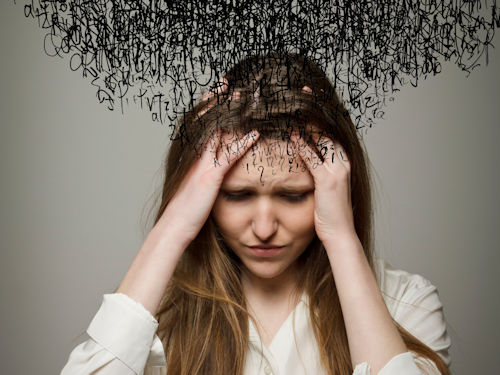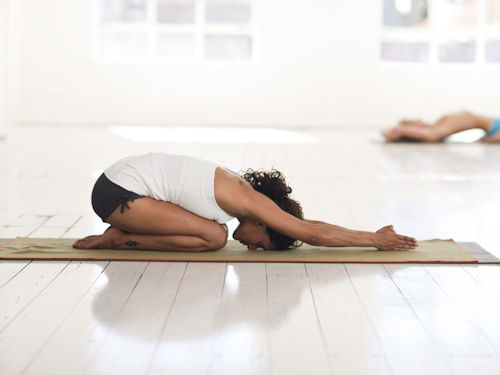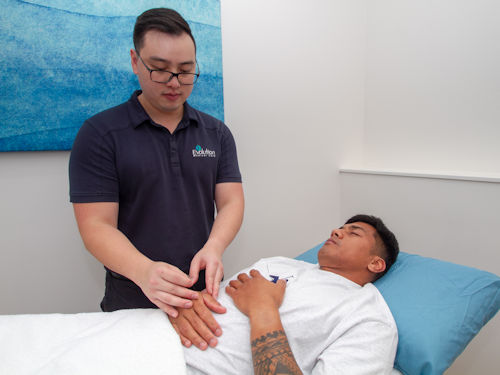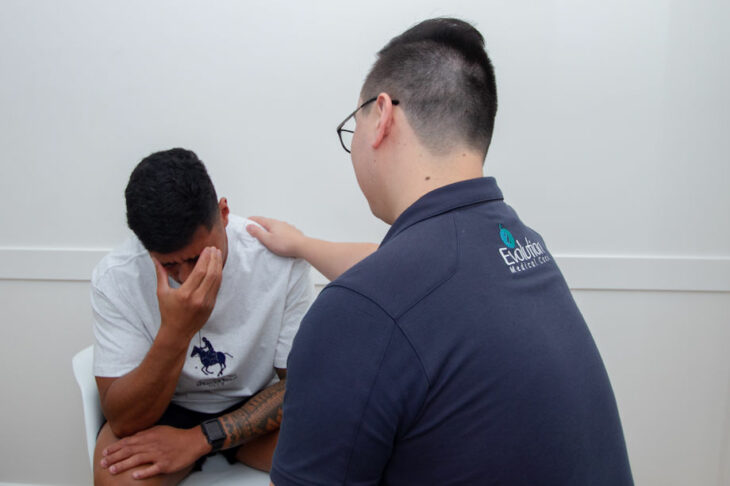What is Anxiety?
Anxiety is a chronic form of worry and nervousness. Constant fears and worries disrupt our ability to function, whether it be at work, with family, or in social settings. We constantly question ourselves, our actions, and worry over possible negative outcomes, second by second, including when we should be sleeping at night.
Many of us suffer anxiety before a new event. Perhaps something major, like a wedding, or a job interview. But when it becomes chronic, affecting us every minute of every day, life seems to come to a standstill. Long-term sufferers find symptoms worsen over time.
Different Types of Anxiety
General Anxiety Disorder (GAD)
GAD is when a person can feel overwhelmed by worry or fear that something may go wrong or at least not the way that is expected. This applies in all aspects of life whether it be work, studies, simple house chores, events, or being around others.
Social Anxiety
Social anxiety involves having a strong sensation of nervousness that we may be embarrassed or judged by others in any setting that involves other people. People that suffer social anxiety may present themselves as introverts or just very quiet, but this is not the case. Social anxiety can occur when being present in front of a large audience or in general interacting with others whether it be colleagues, friends, or family members. Like other anxieties, the main emotions that are experienced with social anxiety are fear and worry. This can also be accompanied with other symptoms such as sweating, tremors, shortness of breath, bowel issues and/or difficulty talking. For it to be social anxiety, these symptoms need to be present for 6 months or more.
Specific Phobias
The majority of the human population have some sort of irrational fear or fears that can greatly impact the ability to live a fulfilled life. Specific phobias are an intensive fear of an object or situation that we perceive as a threat towards our health or safety. When facing our phobias, the mind exaggerates the situation and blows it out of proportion and often a person may experience panic attacks if nothing is done.
Obsessive-Compulsive Disorder (OCD)
Thinking about a specific situation numerous times throughout the day which causes us to perform repetitive behaviours defines OCD. Checking over to see if we have forgotten to do something is fine, but if we had to do this continuously throughout the day then it becomes an issue that impacts on our daily activities preventing us from getting things done or affecting our health. For example, thinking you left the door unlocked and having to wake up and check it once, twice, three times a night or more will cause a significant sleep disturbance.
Panic Disorder
A panic disorder can be having an overwhelming sensation of anxiety, usually fear or worry to the point where it feels like having a heart attack. Symptoms that generally accompany panic disorders are:
- Difficulty breathing
- A sensation of losing control
- Excessive perspiration
- Uncomfortable sensations in the chest and/or stomach
- Shaking
- Losing control of yourself
- Nausea/dizziness
Post-Traumatic Stress Disorder (PTSD)
PTSD, as the name implies, is a stress disorder that is experienced after a traumatic event. Anxiety can occur by having excessive thoughts of the traumatic event reoccurring in the future or living in the past as the trauma is constantly being replayed in the mind, this type of behaviour usually involves other mental health problems such as depression.
A lot of these will have similar presentations to each other as they may start off as one thing and may lead to another.

What Causes Anxiety?
Anxiety is often precipitated by events or lifestyle that wear us down, whether suddenly or overtime. Getting worn down physically, mentally, and even spiritually (when life plans go awry, career, family) over time ends up leaving us constitutionally drained. Even sudden negative shocks in life may leave us struggling to recover.
Causes of anxiety may include:
Lifestyle
- Traumatic experiences, whether physical or emotional
- Long term lack of quantity and/or quality of sleep
- Changes in life, whether unwanted or negative, even positive changes may cause long term increases in anxiety
Work
- Overwork
- Constant stress
- Night work
Emotional
- Constant worry
- Feelings of insecurity
- Lack of support
Anxiety may also affect us at different stages of life, due to maturation and the social change and responsibility changes that accompany it. Appropriate support at this time can make all the difference.

What does anxiety do to health?
Common symptoms of anxiety include:
- Inability to function confidently in day-to-day situations
- Palpitations
- Insomnia
- Panic attacks (sudden worsening of symptoms due to increased stressful situations)
- Rapid breathing
- Cold, clammy hands and feet
What will happen if anxiety is left untreated?
Everyone experiences anxiety from time to time, but constantly feeling anxious can seriously impair health physically and mentally. Long term sufferers will tell you they have no idea how they have managed to keep forging along with the worsening of symptoms over time.
As with all conditions, anxiety is best tackled early. Not just for the individual’s wellbeing and health, but for the health and support of the community at large.
Long-term anxiety may affect:
Sleep
Constantly having thoughts of worry and fear running through our mind can make it difficult to switch off the mind and eventually cause other issues such as insomnia which is the difficulty of falling or staying asleep.
Digestion
Excessive worry like stress impairs on the function of our digestion creating other issues such as bloating, nausea, or irritable bowel disease (IBS).
Respiratory System
When experiencing a panic attack due to anxiety it causes narrowing of the airways making it difficult to breathe.
Heart Disease
Those that suffer from anxiety have a higher chance of developing heart attacks.
Immune System
Anxiety impairs our immune system making it easier for us to fall sick.
Poor Habits
If left untreated for a time being, the body thinks that being anxious all the time is part of normal living and therefore the brain will lay down neural pathways to always wire the mind to be anxious all the time and always on edge.
Hormone Imbalances
Hormones play a big role in how we feel and are affected by our emotional state including anxiety. Hormonal imbalances may lead to a poor diet or lifestyle that may lead to further imbalance of hormones which may heighten anxiety.
Oxytocin, serotonin and testosterone are hormones that help lift the mood, whereas excessive adrenalin, cortisol or low thyroid hormones may contribute to anxiety.
Concentration
With the brain on hyperdrive, anxiety makes it difficult to remain focused with all the other thoughts always running in the background.
Current Medical Treatment
Anxiety can be overwhelming, luckily there are a few options to deal with anxiety. There are primarily two methods to get help, through pharmaceuticals and non-pharmaceuticals.
Pharmaceuticals
After being assessed by a health professional they may decide to prescribe medication in aiding anxiety levels. A common class of drugs are antidepressants which help regulate imbalanced hormones that the body is lacking. Another drug that often gets prescribed is Benzodiazepines. This class of drug is known as a sedative which promotes mental relaxation, therefore, reducing anxiety symptoms.
As with every medication, there may be side effects that come with it. If you are experiencing any negative drawbacks from medication it is important to discuss this with your health practitioner and request other alternatives that they can recommend.
Non-Pharmaceuticals
There are a variety of psychological health professionals that can offer help and procedures that can assist you in regaining control from anxiety. These therapists vary depending on the severity of your condition. Below is a list of professionals who can offer psychological assistance:
- Accredited mental health social worker
- Counsellors
- Complementary alternative medicine
- Crisis assessment team
- General Practitioner
- Mental health nurse
- Occupational therapists in mental health
- Psychiatrist
- Psychologist
- Acupuncturist
Effective ways to get on top of Anxiety – Self Help

When it comes to lifestyle changes to help decrease anxiety levels, choosing actions or activities that are of interest is most important. Encouraging yourself or another to take up an interest will lead to great benefit.
Interests can include Tai Chi, yoga, meditation, sports or gym classes. Movement and exercise are always beneficial to improving healthy balance. Less strenuous activities such as painting, academic subjects or classes, spending time with pets, or even writing can give us better direction and peace of mind.
Some of us are introverts, finding peace in solo projects or smaller group settings. Some are extroverts suffering from social anxiety. Finding the right people, perhaps those with similar values, to share a piece of life with can help us better navigate anxiety.
Would you like professional help to get back to life Anxiety free?
Why see a professional?
It is important to attend to anxiety as early as possible. Leaving the situation unattended and hoping it will resolve will only make matters worse.
Seeking professional assistance not only stops a vicious self-defeating cycle but can help individuals move forward and accomplish life goals without having the constant state of worry or fear holding them back.

Natural, Drug-Free Treatment Protocols
When it comes to treating healthcare complaints, it is always sound practise to start by using drug-free treatment. In this way, further health issues arising as side effects may be avoided whilst getting to the bottom of the issue.
For anxiety, there are quite a few natural treatments that help including:
Acupuncture
Latest scientific research carried out in Australia and all major countries of the world show that acupuncture is an effective treatment for relieving anxiety symptoms. It is both cost-efficient and effective.
Acupuncture needles are inserted at various points on the body to affect sensory nerves that stimulate the brain to regulate endorphin and serotonin production as well as deregulate fight-or-flight panic behaviour.
Cupping Therapy
When it comes to treating mental health issues including stress and anxiety, Cupping therapy is quite potent. It can be used to decrease tension in the fascial system including muscles and tendons, and can also affect the nervous system to decrease pain and associated anxiety.
Remedial Massage
Many stress and anxiety presentations involve significant muscular tension and postural misalignments which are caused by and causative of further anxiety. Remedial Massage is a powerful remedy to decrease muscular tension, resolve postural misalignments and encourage endorphin and oxytocin production which are associated with relaxation and calmness.
Herbal Medicine
Anxiety can cause various signs and symptoms ranging from digestive disturbances to insomnia, palpitations, aches and pains. Herbal medicines are uniquely formulated with up to 15 different herbal medicines for individuals in order to maximise health outcomes with minimal if any side effects.





